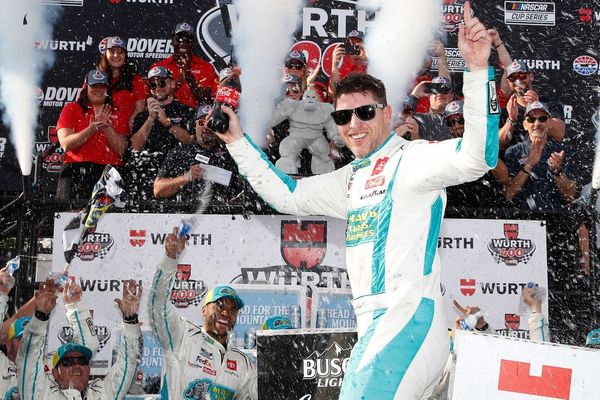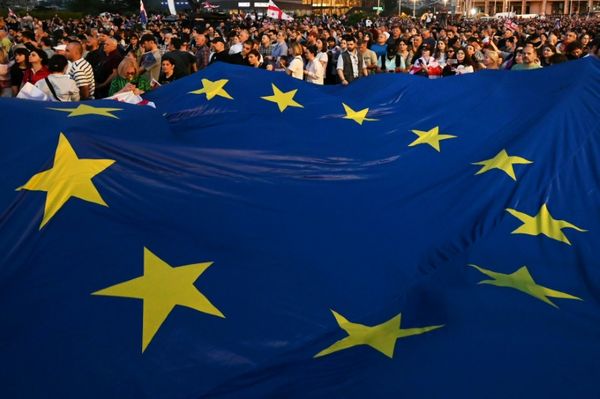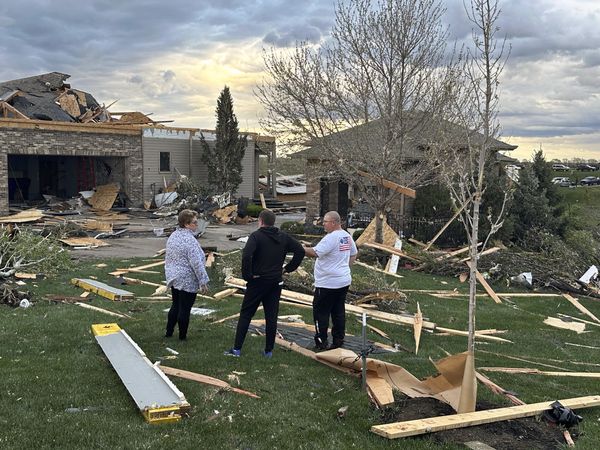
On a recent spring morning on the front lines of eastern Ukraine, a Melbourne man in his early 30s went through his usual routine of making himself a cup of filter coffee.
“A lot of the guys just drink Nescafe, but being from Melbourne and everything, I want the good shit,” the volunteer soldier Robert — a pseudonym — tells Crikey. “I get the coffee mailed from Kyiv. It’s a good morale thing, to have little touches like that.
“Some of the guys say ‘You’re a bit soft,’ but you know what — if this is what makes it tolerable being out here, I’m going to do it.”
Crikey spoke to young men who belong to a small group of Australians who have given up the comfort and peace of life back home to take up arms and defend Ukraine against Russia’s invading forces. Over there, it’s a life of trenches and mud, of bullets, shells and drones.
“It’s a pretty shit experience when you’re at the zero line — you can’t really go outside and there’s a risk of being killed, constantly,” Robert says. “Drones are flying everywhere — it’s a fucking nightmare at times.”
‘This was my time to step up’
Robert has been in Ukraine long enough to know what life was like before Russia’s February 2022 invasion — which escalated a conflict that had been raging since 2014 in Ukraine’s south and east into a full-scale war across the entire country.
“I really love Ukraine as a country — many of the cities are amazing,” Robert says. “I’m kind of privileged to be able to say this, but in some aspects I found I had a better quality of life here than I do in Melbourne.”
That love for Ukraine and a feeling he owed a debt to its people informed the decision to join the country’s defence forces: “For me it was like, I want to know I’ve done everything possible to help out. I want to know in my heart, mind and soul. I don’t want to have the regret — that this was my time to step up, and I didn’t do it. I would have lived with that burden forever.
“I genuinely believe that what’s happening here is the equivalent in terms of evil as the second world war — there is genocide being perpetrated in Ukraine. I’ve seen cities and towns destroyed, civilians killed, and the Ukrainian national identity being destroyed.”
Brushes with death
Joe — a pseudonym — says he decided to join the military after initially arriving in the country as a humanitarian volunteer.
“When the full-scale invasion happened last year, I started seeing the images and the videos coming out about what the Russians were doing to the civilians and to the cities,” the Brisbane man, also in his 30s, tells Crikey.
“It just really kind of stuck with me. And when President [Volodymyr] Zelenskyy said they needed foreign volunteers to come and help, I said: I’m physically fit. I’ve got two hands, two legs, I’ve got a brain, surely there is something I can do.
“It took me a couple of months to actually make the decision. But when I arrived in Poland, and saw the Ukranian refugees protesting in the middle of Krakow square, it hit me — 100%, this is something that’s the right thing to do.”

Neither man has any family connections to Ukraine, nor prior military experience. Since signing up, both have had near brushes with death.
“On my last deployment out there, when we were evacuating from our position, we had to cross a field that was a couple of kilometres long,” Joe says. “Artillery was landing in this field. It’s very random where it hits, but we could see it, and you can hear it. After it lands it takes a couple of seconds before it explodes, and the closer it is to you, the less time you have to react to it.
“The shells were coming in about 100 to 200 metres from us, and then one came in — I heard the sound behind me to my right.”
Joe says as he hit the ground the shell skipped over his head and landed around 10 metres to his left. It didn’t explode: “I thought ‘fuck’, if that had exploded I’d have been gone.”
‘I don’t think I’ll ever be the same again’
Both men say they have begun experiencing early signs of post-traumatic stress.
“[The risk of getting PTSD] is something that’s always on my mind,” Joe says. “When I returned to Australia last time I went and spoke to a psychologist, and it helped. This is not an experience where you come out and think everything is going to be fine.”

Robert says he often wonders what his life will be like after the war.
“I don’t think it’ll ever be the same again,” he says. “I don’t feel mentally traumatised by my experience here. But there was a point when I went home for a brief break last year, and I heard a motorcycle drive past. I don’t know why my brain did this — I knew it was a motorcycle, logically — but it sounded like artillery.
“There was a brief moment where I went: ‘How is there shelling in Melbourne? How is the war here?’ I already know that to an extent, I’m dealing with the mental toll of working here.”
‘Small number’ of Aussies in Ukraine
The two soldiers don’t know each other, but each say they are aware of about a dozen other Australians who had at some point served in Ukraine’s armed forces.
Department of Foreign Affairs and Trade (DFAT) officials told budget estimates last week the government was aware of only a handful of Australians who had gone to Ukraine to fight.
“We’ve had an indication from the Department of Home Affairs, from departure records, there is likely to be a small number of Australians fighting in Ukraine,” DFAT first assistant secretary Kate Logan said, adding the government believed fewer than 20 fighters had gone to Ukraine “for that purpose”.
“I want to say a small number, less than 20, that Home Affairs suspects have gone to Ukraine for that purpose.”
DFAT first assistant secretary Andrew Walter from the department’s legal policy division, under questioning from Greens Senator Jordon Steele-John, said it wasn’t necessarily illegal for Australians to fight for another country’s military.

“There could be a whole range of legal risks that apply to an individual, however fighting with the armed forces of another country is not necessarily a criminal offence under Australian foreign fighter laws,” he told estimates. “However, you could potentially commit a criminal offence in the event you fought with a non-national fighting force — there can be risks there.”
World unites behind Ukraine
Russia’s war in Ukraine has been widely condemned by the international community, with many viewing it as an illegal land grab motivated by imperialism, Australian National University Centre for European Studies researcher Sonia Mycak says.
“Russia’s invasion of Ukraine has created the greatest geopolitical crisis the world has seen since the second world war,” Mycak tells Crikey. “[Russian President Vladimir] Putin never accepted the dissolution of the Soviet Union or the idea of an independent Ukraine. He does not accept that Ukraine has its own language, culture and identity.”
When Russia began its full-scale invasion last year, it expected the war to go much more smoothly than it did, she says. It had hoped its assault, from several directions at once, bombing cities and rolling in with tanks, would quickly overwhelm Ukraine. But Ukraine stood its ground and successfully defended itself, surprising both Putin and international observers.
“The West owes Ukraine a debt of gratitude,” Mycak says. “Should Putin be successful in any sense, we would be setting a dangerous precedent where a large and powerful neighbour can take over a smaller nation.
“Putin’s actions are really shaking the foundations of the world — we don’t want to be living in a world where a large neighbour can rape, torture and murder innocent people. We want to live in a world where people can live peacefully within their borders.”

The invasion inspired action from all over the world, including harsh sanctions on Russia and military assistance for Ukraine. Australia, which says it’s the largest non-NATO contributor to Ukraine’s defence, has spent at least $510 million on assistance, including sending Bushmaster protected mobility vehicles and drones.
Ukrainian Defence Minister Oleksii Reznikov said at the weekend that Australia was preparing to give fresh aid in July, although Prime Minister Anthony Albanese has so far refused to confirm that. The Sydney Morning Herald reported on Tuesday morning the support package is likely to include a set of armoured cars known as Hawkei, which has been high on Ukraine’s wish list for months.
Holding the line
Robert says he welcomes Australia’s continued support for Ukraine, and hopes the public’s attention won’t fade as the war drags on: “The war hasn’t ended just because the media coverage has died off a bit — cities are being bombed daily with drones and missiles. It’s happening every day.”
Those strikes are happening all across the country, but it’s in Ukraine’s east, where both Australians are deployed, where most of the heavy on-the-ground fighting is going on.
On the front line, Ukrainian forces use abandoned buildings and trenches to set up defensive positions to hold the Russians back. Often the Russian positions are just a few hundred metres across no man’s land.
“We have AKs, machine guns and RPGs, and we hold the line and help spot and correct our artillery fire,” Joe says. “If the Russians are advancing, we need to obviously hold them back so they don’t break our line. And when our guys are shooting, we’re spotting to see where the artillery is landing and then trying to correct it to the right target.”

Robert says he tends to do missions on the front line that last a few days at a time — but occasionally as short as a few hours.
“The other day I was talking to my friend, we were in a forest, just lying on the ground, relaxing, as the Ukrainians fired artillery over us and the Russians were shelling nearby,” he says.
“I asked my friend, ‘Isn’t it strange you can just lie here, even though you can be killed at any moment, and have a certain moment of peace?’ He said: ‘If you don’t have that you’ll go crazy.’ I think over time you just adjust to the danger.”
‘I know I’ve contributed’
On the front line, the food of choice is ready-to-eat ration packs or a chocolate bar for quick energy, whereas in the rear, there is a wider variety.
“Volunteers deliver food for us, although it’s hard to get fresh fruit,” Robert says. “Guys go fishing in the river and cook fresh fish. It varies from week to week what stuff we get — the absolute luxury at the moment is having eggs. If you’re eating eggs you’re living the high life.”
Joe says he’s been nursing a squeezy pack of Vegemite that’s nearly run out, and has been craving Weet-Bix for breakfast: “That’s one thing I haven’t had at all and really miss. I’m going to buy that as soon as I go back to Australia.”
Robert has been in the war long enough to see the seasons change.
“Winter was not fun, I’ll tell you that,” he says. “Now everything is drying out, and it’s easier to dig and make positions. But summer has downsides too — there are lots of fires, and it gets sweaty wearing all the gear. It can be quite a miserable experience. Also fighting traditionally increases in the summer.”
Foreign volunteers have been told they can leave the defence force when they want. So when is the right time to quit? When will the debt be considered repaid?
“I don’t know when the debt will be realised, but I know I’ve emotionally fulfilled an obligation,” says Robert. “In some ways I already feel like I’ve done my part — I’m pretty burnt out.
“I know I’ve contributed; I know through my efforts I’ve helped kill Russians trying to destroy the country. There’s nothing keeping me here other than my own loyalties.”







